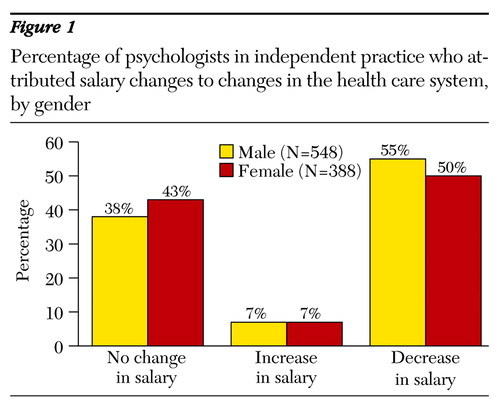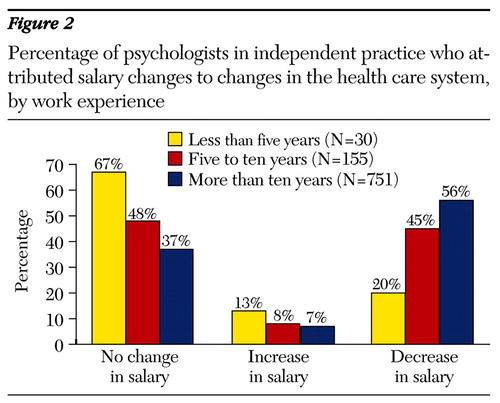Datapoints: Salary Changes Among Independent Psychologists by Gender and Experience
The American Psychological Association has monitored how changes in the health care system have affected salaries of psychologists in independent practice—licensed, doctoral-level psychologists in individual private practice or in group psychological or medical practice (1,2). This column examines salary changes among these practitioners in relation to gender and years of work experience using data from the most recent salary survey, conducted in 1999 (3).
The 1999 survey was sent to a stratified random sample of 20,000 members of the association who live in the U.S. It yielded an overall response rate of 51 percent, of whom 936 respondents (9 percent) were independent practitioners who answered a question about perceived salary shifts associated with changes in the health care system. Fifty-nine percent (N=548) of the independent practitioners were men, and 41 percent (N=388) were women.
Fifty-five percent of the men (N= 302) and half of the women (N=194) in independent practice reported a decrease in salary from 1998 to 1999 that they attributed to changes in the health care system (see Figure 1); the decrease averaged 17 percent for men and 19 percent for women. Thirty-eight percent of the men and 43 percent of the women indicated no change in salary for those years. Only 7 percent of each group directly attributed salary increases to health care reform.
Figure 2 shows that practitioners with more years of work experience were more likely to report a salary decrease that they attributed to changes in the health care system. Fifty-six percent of the practitioners who had worked for more than ten years reported a salary decrease, while practitioners with less than five years of experience were more likely than their more experienced counterparts to report an increase or no change in salary.
These findings should be viewed with two caveats in mind. First, they reflect the respondents' perceptions of salary changes related to changes in the health care system and are not derived from actual salary data. Second, there may well be competing explanations for the salary changes.
Dr. Williams is director of industry research for the American Society of Association Executives in Washington, D.C. He formerly was assistant director of the research office of the American Psychological Association, where Dr. Kohout is director and Ms. Wicherski is a research consultant. Send correspondence to Dr. Kohout, APA Research Office, 750 First Street, N.E., Washington, D.C. 20002. Harold Alan Pincus, M.D., and Terri L. Tanielian, M.A., are coeditors of this column.

Figure 1. Percentage of psychologists in independent practice who attributed salary changes to changes in the health care system, by gender

Figure 2. Percentage of psychologists in independent practice who attributed salary changes to changes in the health care system, by work experience
1. Williams S, Kohout JL, Wicherski M: An update on salaries of psychologists in independent practice. Psychiatric Services 51:967, 2000Link, Google Scholar
2. Williams S, Kohout JL, Wicherski M: Changes in salaries of independent practitioners of psychology. Psychiatric Services 49:1020, 1998Link, Google Scholar
3. Williams S, Wicherski M, Kohout JL:1999 Salaries in Psychology. Washington, DC, American Psychological Association, 2000Google Scholar



